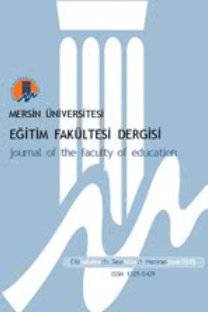The Investigation of Pre-service Elementary Mathematics Teachers’ Subject Matter Knowledge About Probability
Probability, subject matter knowledge, conceptual understanding, procedural understanding, pre-service mathematics teachers
___
- Ball, D.L. (1988). The subject matter preparation of prospective mathematics teachers: Challenging the myths. East Lansing, MI: National Center for Research on Teacher Education.
- Ball, D.L. (1990). The mathematical understandings that prospective teachers bring to teacher education. The Elementary School Journal, 90(4), 449-466.
- Batanero, C., & Díaz, C. (2012). Training teachers to teach probability: reflections and challenges. Chilean Journal of Statistics, 3(1), 3–13.
- Begg, A., & Edwards, R. (1999, December). Teachers' ideas about teaching statistics. Paper presented at the combined annual meeting of the Australian Association for Research in Education and the New Zealand Association for Research in Education. Melbourne, Australia.
- Biehler, R., Ben-Zvi, D., Bakker, A., & Makar, K. (2012). Technology for enhancing statistical reasoning at the school level. In K. Clements, A. Bishop, C. Keitel, J. Kilpatrick, & F. Leung (Eds.), Third international handbook of mathematics education. New York: Springer.
- Bush, W. et. al. (under review). Diagnostic mathematics assessment for middle school teachers. Journal of Mathematics Teacher Education.
- Center for Research in Mathematics and Science Teacher Development University of Louisville. (2008). Diagnostic mathematics assessments for elementary school teachers. Retrieved 18/11/2016, from https://louisville.edu/education/centers/crmstd/diag-math-assess-elem.
- Creswell, J.W. (2007). Qualitative inquiry and research design: Choosing among five traditions (2nd ed.). Thousand Oaks, CA: Sage.
- Green, D. (1987). Probability concepts: putting research into practice. Teaching Statistics, 9(1), 8-14.
- Jacobbe, T. (2007). Elementary school teachers’ understanding of essential topics in statistics and the influence of assessment instruments and a reform curriculum upon their understanding (Doctoral dissertation, Clemson University).
- Hiebert, J., & Lefevre, P. (1986). Conceptual and procedural knowledge in mathematics: An introductory analysis. In J. Hiebert (Ed.), Conceptual and procedural knowledge: The case of mathematics (pp. 1-27). Hillsdale, NJ: Erlbaum
- Jones, G.A., & Thornton, C.A. (2005). An overview of research into the teaching and learning of probability. In Exploring Probability in School (pp. 65-92). Springer US.
- MONE (2013). Ortaokul Matematik Dersi (5, 6, 7 ve 8. Sınıflar) Öğretim Programı (Middle-School Mathematics Curriculum (Grades 5, 6, 7 and 8). Ankara: MEB.
- Moore, D.S. (1997). New pedagogy and new content: The case of statistics. International statistical review, 65(2), 123-137.
- Nicholson, J.R., & Darnton, C. (2003). Mathematics teachers teaching statistics: What are the challenges for the classroom teacher? In Proceedings of the 54th Session of the International Statistical Institute. Voorburg, The Netherlands: International Statistical Institute.
- Quinn, R.J. (1997). Effects of mathematics methods courses on the mathematical attitudes and content knowledge of preservice teachers. The Journal of Educational Research, 91(2), 108-114.
- Scheffler, I. (1965). Conditions of knowledge: An introduction to epistemology and education. Chicago: Scott, Foresman, and Company.
- Shaughnessy, J.M. (1992). Research in probability and statistics: Reflections and directions. In Grouws, D.A. (Ed) Handbook of research on mathematics teaching and learning: A project of the National Council of Teachers of Mathematics. (pp. 465-494). New York, NY, England: Macmillan Publishing Co. Inc.
- Star, J.R. (2005). Reconceptualizing procedural knowledge. Journal for Research in Mathematics Education, 36(5), 404-411.
- Star, J.R., & Stylianides, G.J. (2013). Procedural and conceptual knowledge: Exploring the gap between knowledge type and knowledge quality. Canadian Journal of Science, Mathematics, and Technology Education, 13(2), 169-181.
- Stohl, H. (2005). Probability in teacher education and development. In Exploring probability in school (pp. 345-366). Springer US.
- Thompson, A.G. (1984). The relationship of teachers' conceptions of mathematics teaching to instructional practice. Educational Studies in Mathematics, 15, 105-127.
- Thompson, A.G., Philipp, R.A., Thompson, P.W., & Boyd, B.A. (1994). Calculational and conceptual orientations in teaching mathematics. In A. Coxford (Ed.) Profesional development for teachers of mathematics: 1994 Yearbook (pp. 79-92). Reston, VA: National Council of Teachers of Mathematics.
- Watson, J.M. (2001). Profiling teachers' competence and confidence to teach particular mathematics topics: The case of chance and data. Journal of Mathematics Teacher Education 4(4), 305-337.
- Yayın Aralığı: 3
- Başlangıç: 2005
- Yayıncı: Mersin Üniversitesi Eğitim Fakültesi
Okul Öncesi Dönem Çocuklarının Öğrenme Stillerinin İncelenmesi
Öğretmen Adaylarının Farabi Değişim Programı’na Yönelik Görüşleri
Çavuş ŞAHİN, Mehmet Kaan DEMİR, Serdar ARCAGÖK
Farklı Öğretmenlik Programına Devam Eden Öğretmen Adaylarının Öğretmenlik Mesleğine Yönelik Algıları
Figen ÇAM TOSUN, Arslan BAYRAM
Okulun İnsan Kaynağının Bir Öğesi Olarak Okul Yardımcı Personellerinin Anılarının İncelenmesi
Zehra KESER ÖZMANTAR, Şeyda CİVELEK
Interactive Videos in Foreign Language Instruction: A New Gadget in Your Toolbox
Okul Yöneticilerinin Maarif Müfettişlerine Yönelik Etkileme Taktikleri
Astronomi Öğretiminde Öğrenme Amaçlı Çoklu Yazma Etkinliklerinin Değerlendirilmesi
